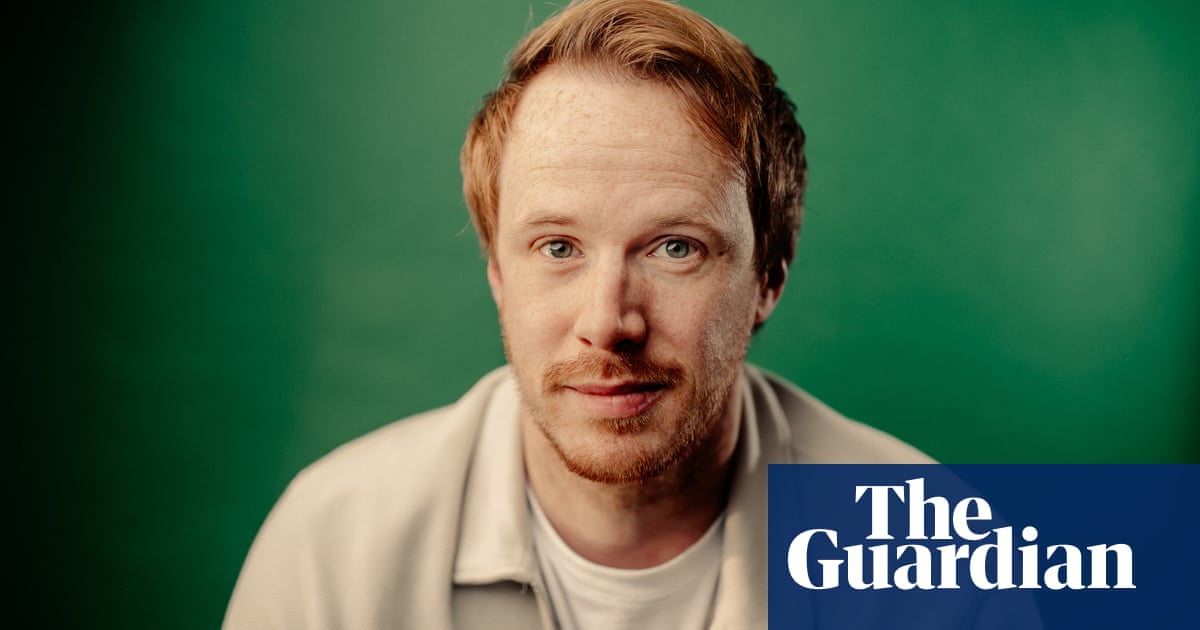When Alex Partridge decided to become a podcaster, he dismantled his bed and soundproofed his bedroom, spent a fortune ordering recording equipment, hired a producer and booked guests – all in one evening. As an entrepreneur, the creator of the online entertainment brands Unilad and LadBible, he thought a podcast about business was a great idea. He could certainly talk about the downs as well as the ups, given that he had been kicked out of one of those companies, and only got back in after a legal battle that pushed him into alcoholism.
Three days later, before the equipment had even been delivered, he’d lost interest. “I remember just being so confused,” he says, “not understanding how I could have this feeling of emptiness, compared to the euphoria and the determination that it was my new life’s purpose just three nights before.”
He explained this to the producer he’d hired, along with his history of abandoned projects, and the producer casually asked Partridge when he’d received his ADHD (attention deficit hyperactivity disorder) diagnosis. “I think he recognised this pattern.”
Partridge had no idea what he meant – then, when he found out he actually did have ADHD, he realised this was what the podcast should really be about.
We are talking at the dining room table in Partridge’s Brighton flat, a place with security gates and parking spaces for fancy cars. His French bulldog is pottering around. Partridge, 34, is a great talker, but he avoids eye contact – an aspect of life with ADHD he has become aware of. Before, he would force himself to meet someone’s gaze, thinking it was rude not to, but it doesn’t work for him. “I say you can either have my undivided attention or my perfect eye contact, but you can’t have both. Now we have this awareness of neurodiversity, and how things you think are normal behaviours, which everyone should do, aren’t the case at all.”
In March 2023, three months after his diagnosis, Partridge launched a podcast, ADHD Chatter, interviewing experts and guests, often those diagnosed later in life. His new book, Now It All Makes Sense: How an ADHD Diagnosis Brought Clarity to My Life, is part-memoir alongside what he has learned from those interviews. Shame, he says, is a key theme. “It’s not being able to understand why your peers are progressing in their life with apparent ease.” Masking – making an effort to fit in – is another issue, “and having no self-esteem because they’ve spent so long pretending to be someone they’re not”.
There is, he says, a “whole journey of post-diagnosis realisations. And there’s lots of emotion in there. People I speak to are often in their 30s, 40s, 50s, and they’ve spent years pretending to be someone they’re not.”
Partridge didn’t fit the stereotype of a child with ADHD. He was quiet; the hyperactivity, which he describes as “highly caffeinated squirrels barrelling about” was confined to his brain. Writing the book, he says, has helped him look at his whole life “through the lens of this new awareness of ADHD. Anxiety has been the main theme throughout my life.”
He had his first panic attack around the age of six, in a classroom when a teacher singled him out, and would have them throughout his life. He didn’t enjoy school, felt like a loner and still remembers the slights from other children – one told him he was “weird”. He was happier at home (he grew up in Eastbourne), starting projects and showing an entrepreneurial streak: a board game he devised that was sent off to games companies; a stall outside his house selling objects his father, an antiques dealer, couldn’t shift; a car-washing business.
He was a “weird contradiction”, he says – shy and unsociable, but confident enough to knock on doors and try to convince strangers to let an eight-year-old wash their car. “In short doses, I could put on this mask and be this confident person. Whereas at school, I couldn’t maintain that character all day, and that’s what made me anxious.” Even now with the podcast, he says: “I meet people for two hours, and then that’s it. It’s incredibly hard work for me to maintain that level of presentation.”
He noticed he would change his personality, depending on who was around him. “I would just adopt their whole personality, their interests, their tone of voice. I didn’t really know who I was.”
He has what he realises now is rejection sensitive dysphoria, which comes up again and again on the podcast. Thought to be one trait of ADHD, it’s an experience of intense emotional pain when faced with actual or perceived criticism or rejection. “It can be really debilitating. People don’t put themselves forward for promotion. People don’t stand up for themselves or set boundaries because they’re so fearful of encountering a rejection. People don’t leave the house. It turns you into a massive people pleaser, because you do everything you can to avoid that feeling of being triggered.”
Having an awareness of it helps, particularly now in the way he and his partner communicate, but every negative comment throughout his childhood and teen years stuck with him, “to create an adult that has very low self-esteem, is very sensitive to rejection and criticism. You have this defence around you, this shield up.”
Partridge says he doesn’t have many of the “stereotypical negatives of ADHD, although there’s definitely forgetfulness, struggle with attention and organisation. But for me, so many more of what I now know to be the positives of ADHD have served me well – but only once I’ve understood how to get that anxiety under control. I think it’s that racing mind that has enabled me to be quite creative, and start these social-media brands and the podcast. There were so many positives of ADHD which I related to, like the creativity and the pattern recognition and being calm in a crisis.”
He went to Oxford Brookes University to study hospitality management because he had no idea what to do; by then, he’d had a series of businesses he’d started then lost interest in. “I talk about that a lot in the book, how to manage that boom-and-bust cycle and work on self-awareness so you can tell, when you have an obsession, whether it is connected to your intrinsic motivations, and not just a product of a short-term dopamine excitement. When things get tough and you’re over the honeymoon period of the new idea, if it’s not connected to your internal motivations, that’s when you’ll quit because the pull isn’t strong enough. But I didn’t know that at the time.”
At university, he was still suffering with anxiety and dropped out after just one lecture, then had the idea to run a one-man pizza company out of his bedroom. “I impulsively spent half my student loan on this huge freezer,” he says with a smile. He filled it with supermarket pizzas, set up a Facebook page and hired four students on bikes to make deliveries to other students. Then, lacking a food safety hygiene certificate, he was shut down.
He was working in a museum and a nightclub, so was able to stay in Oxford and pay his rent. When his girlfriend at the time broke up with him, telling him they were too different, Partridge went into, he says, “problem-solving mode”. She was editing an online university magazine, so he thought if he could come up with his own “that might make her think we’ve got something in common, and win her back. That was the sort of insanity at the time.” He came up with a Facebook page aimed at male students and called it Unilad. Social media, recently gathering pace, became Partridge’s new obsession. “I immediately forgot about the breakup and just spent the next couple of months in my bedroom.”
A mix of jokes, viral videos and banter-as-content, Unilad took off. “It was very much the right place, right time,” says Partridge. “Facebook were pushing their ‘pages’ and it grew really fast.” A pizza company approached him and offered him money to promote it. “I worked out that even if I somehow graduated, the [annual] salary I would get was less than what this company had just offered me to do a post.” Back home in Eastbourne, he found his followers growing by the thousand in the time it would take to walk to the local shop and back.
By now, Unilad was also a website, to which anyone could upload content (he had set up another similar brand, LadBible, too). In 2012, Partridge temporarily took the site down and apologised after someone published a piece encouraging young men to consider the low chances of rape being reported. “There was so much demand for content, I made the decision to turn it into a website where people could just submit content. It just turned into this wild west, unregulated website where there were hundreds of pieces of content getting on every day. The advertisers were there, the revenue was coming in, everything was brilliant, and then I logged on to Twitter, saw it was trending for all the wrong reasons, pulled the site down, issued an apology, and said I would greatly improve the editorial policy, which is what we did. The biggest mistake, I think, was allowing that user-generated feature, which, unregulated, brought out the most vile side of lad culture you can imagine.”
But wasn’t Unilad – and LadBible, alongside many others – guilty of fuelling lad culture? “It might have done. I really don’t know.” But, he adds, “it could have been a lot more responsible, definitely.”
Partridge sold LadBible in 2012. “I put the money into growing Unilad further. I look back now, and I think I got overwhelmed.” With around half a million followers, he needed help to deal with the site. He posted on Facebook to gauge interest, and, in May 2013, entered into a partnership with two entrepreneurs. He says that a few months later, trying to log into the Facebook page, he realised that the password had been changed and he was being pushed out. In a panic, he drove to the nearest petrol station, bought a bottle of wine, came home and drank it.
He thought it would just take a few legal letters to resolve the problem; it ended up taking five years and a court case. Essentially, his former partners had set up a new company with the Unilad name; Partridge was fighting to reinstate his one-third share. “I remember the day, about a year into the process, in my solicitor’s office, and he said: ‘You’ll have to take the witness box.’ The thought of me stood there with the judge, legal teams, my family … My mind just flashed back to that classroom scenario of all the attention on me. I remember running out of the office and going to buy a bottle of vodka.”
He doesn’t remember much after that, except for a nurse telling him later in hospital that two people had found him in an alleyway, and that as he tried to stagger away he fell and hit his head. “I felt this huge amount of shame and anxiety, and I knew the only thing that would take it away was more alcohol.” He ran out of the hospital and was tackled by security. The police were called. “The next thing I knew, I was in the back of a police car being cautioned. My parents had been called, and I remember them looking at me through the window of the police car with fear in their eyes.”
Another time, staff at a hotel called an ambulance because they were alarmed at how many drinks Partridge was ordering to his room, alone. “My parents were told: one more drink, and I most likely would have died of alcohol poisoning.”
His mother chaperoned him every day to court, not trusting him to not get drunk. Two months later, in the summer of 2017, his solicitor called to tell him he had won his case. “It sounds cliched but I literally fell to my knees and burst into tears, because for me it was a five-year legal battle, which comes with its own challenges. But more importantly, it was a mental-health battle that nearly killed me.”
He had started going to AA meetings soon after the police caution. He thinks now that he has a “circumstantial drinking relationship. Drinking has always been how I’ve dealt with anxiety, and the court case was the worst anxiety I’ve ever had. During periods where everything’s OK, my relationship with alcohol has been OK.”
Unilad went into administration in 2018, then was bought by the same company that had earlier bought LadBible. The price was undisclosed but it was enough for Partridge, then 29, not to have to work again. (Earlier reports had valued the brand, which was one of the largest on Facebook, at up to £40m.) “I thought that was what would make me happy,” he says, and in the short term it did. He spent the next two years doing little more than playing computer games. “I kind of got addicted, and that self-esteem issue sort of crept up, of not feeling like I was doing anything.”
That was when he decided to start a podcast, and received the ADHD diagnosis that made sense of much of his life. “You look back and wish you could go back to the kid having the anxiety attack in the classroom and say: ‘You’re not broken – you’re just different.’ The next best thing I could do was to try to make as much noise as possible about ADHD, in the hope that somebody else hears it and they start their journey of awareness earlier than I did.”










